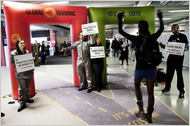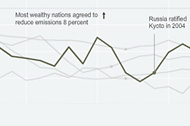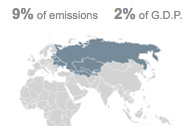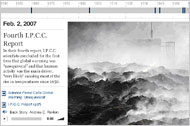 Under Banner of Urgency, Delegates Tackle PolicyDec 7,2009 - Andrew C. Revkin and Tom Zeller Jr. and James Kanter - The New York TimesCOPENHAGEN — Two mock gateways set up by environmental campaigners — a fiery red one symbolizing the perils of climate change and a green one representing an international climate accord to address it — greeted delegates on Monday as they filed into a conference center here.
“Political deals and global warming this way,” the advocates shouted as they beckoned the delegates toward the inverted U-shaped red gate. Placards at the entrance to the green one read: “Binding Deal for a Safe Future.” The delegates, who had first passed under a giant wind turbine blade, were not required to go through the gates, set up by the World Wildlife Fund. But some chose to: one man jokingly did the limbo all the way through the red hellfire passage. Dante or Michelangelo might have sniffed at the text and the visuals. But evocations of Judgment Day were a consistent undercurrent in speeches and conference materials on the opening day of the meetings, where representatives of about 200 nations hope to hammer out the details of an international climate accord.
To help establish the mood, the choreographers of the meeting screened a short film. In one scene, a young girl awakens to a grim inheritance should negotiators leave the meeting empty-handed: a scorched earth, menacing storms and an all-swallowing sea. “Please,” the girl says to the camera as violins rise to a crescendo, “help the world.” As with the climate talks in Poznan, Poland, in 2008 and in Bali, Indonesia, in 2007, any serious political horse trading among nations is expected to take place in the second week, when world leaders arrive. President Obama is scheduled to visit on Dec. 18, the last day of the meetings. Meanwhile, the assembled delegates listened to opening remarks and prepared to hunker down and sort out things like beach erosion, targets for reducing greenhouse gas emissions, payments to developing countries for preserving forests and other thorny issues. “Let’s get it done!” said Connie Hedegaard, the Danish minister presiding over the conference. But with no sign that the many factions in the climate debate were any closer to agreement, Denmark’s prime minister, Lars Lokke Rasmussen, nodded to the gravity of the challenge. “Welcome to two weeks where we are to perform what is most difficult in politics,” he said. A Plan With Skeptics Jonathan Pershing, the State Department’s deputy special envoy on climate change, talked about emissions reductions at a news conference after the opening session, defending the targets promised by the United States — a reduction in the range of 17 percent over 2005 levels by 2020, 30 percent by 2025, etc. But a British reporter wanted to know about the e-mail messages and documents that a British climate research center says were stolen from one of its servers: Would they undermine the talks? The files — which include mentions of deleting potentially embarrassing e-mail messages, seeming attempts to block the publication of papers by competing scientists and adjustments to research data — have been seized upon by skeptics as evidence of corruption in climate science. But Mr. Pershing predicted that the e-mail flap would end up as “a small blip on the history of this process.” “I think they’ll have virtually no effect,” he said, adding that the e-mail messages had also “released a barrage of additional information which makes clear the robustness of the science, the multitude — the enormous multitude — of different strands of evidence that support the urgency and the severity of the problem.” Mr. Pershing said it was “unfortunate, and in fact shameful,” that “some scientists who’ve devoted their lives are being pilloried in the press without due regard to process.” Moving Right Along As the plenary session moved from harp and trumpet music to administrative details, Ms. Hedegaard, the hard-driving climate minister serving as president of the conference, was clearly fearing a long series of long-winded speeches. Be brief, she beseeched the participants, and keep things moving. But perhaps predictably, few listened. Kevin Conrad, a representative of Papua New Guinea known for admonishing the United States for slowing things down at negotiations in Bali in 2007, interrupted what was supposed to be a procedural nicety, the reading of the rules. He said he disagreed with the rules and wanted to make a change. Ms. Hedegaard encouraged him to delay consideration of the issue. But he doggedly pressed his buzzer again, asking when she would hear him out. Ms. Hedegaard finally yielded. Later this week, she said. A Dubious Honor In the evening, it was time for the announcement of the Fossil of the Day awards. Since 1999, that dubious honor has been doled out each day at annual climate talks. Environmentalists vote for the country judged to have made the most outstanding effort to block progress in negotiations. Clad in a tuxedo, Ben Wikler of Cambridge, Mass., announced that Canada had come in third. He cited statements before the conference by Canada’s environment minister, Jim Prentice, that the “hype” around the event would not sway the country to bolster its emission targets. Second place went to Finland, Austria and Sweden, for floating a proposal, since adopted by the European Union, to prevent countries from being penalized for the full extent of greenhouse gas emissions from logging. First place, he said, went to all the industrialized countries “for collectively showing up in Copenhagen with too low an ambition level to cut carbon and prevent catastrophic climate change.” |
Email this page to a friend
If you speak another language fluently and you liked this page, make
a contribution by translating
it! For additional translations check out FreeTranslation.com
(Voor vertaling van Engels tot Nederlands)
(For oversettelse fra Engelsk til Norsk)
(Для дополнительных
переводов проверяют
FreeTranslation.com )






